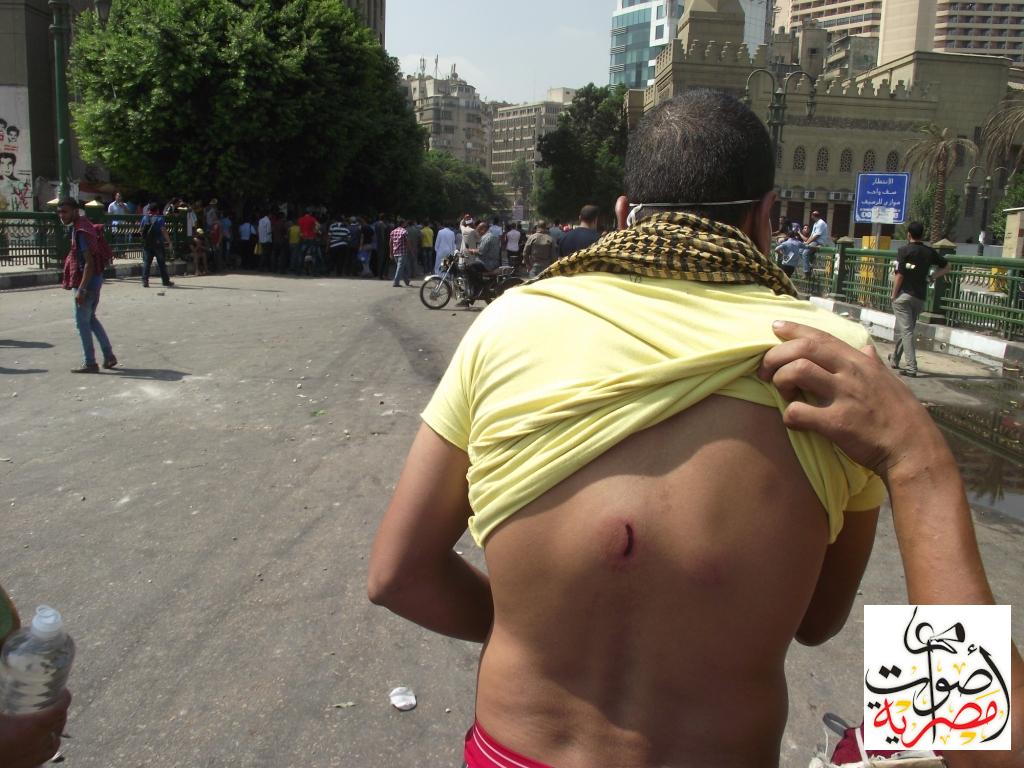Latest NEWS
- Aswat Masriya, the last word
- Roundup of Egypt's press headlines on March 15, 2017
- Roundup of Egypt's press headlines on March 14, 2017
- Former Egyptian President Hosni Mubarak to be released: lawyer
- Roundup of Egypt's press headlines on March 13, 2017
- Egypt's capital set to grow by half a million in 2017
- Egypt's wheat reserves to double with start of harvest -supply min
- Roundup of Egypt's press headlines on March 12, 2017
Egypt's Mursi condemns embassy attack, protesters clash

Confrontations between security forces and protesters outside the U.S. embassy in Cairo on Thursday, September 13, 2012. Ahmed Hamed/Aswat Masriya.
CAIRO, Sept 13 (Reuters) - Egypt's president said on Thursday he supported peaceful protest but not attacks on embassies, after Egyptians angry at a film deemed insulting to the Prophet Mohammad climbed into the U.S. embassy in Cairo and tore down the American flag.
Highlighting the challenge facing President Mohamed Mursi, demonstrators hurled stones at a police cordon blocking their approach to the fortress-like embassy as his televised address was broadcast on Thursday. Police fired teargas back.
The state news agency reported that 16 people were injured.
"Expressing opinion, freedom to protest and announcing positions is guaranteed but without assaulting private or public property, diplomatic missions or embassies," said Mursi, an Islamist who is Egypt's first freely elected president.
He pledged to protect foreigners in Egypt, a comment he repeated during a news conference in Brussels where he was making his first European trip to build ties with European Union states and secure support for Egypt's embattled economy.
The EU offered macroeconomic aid of 500 million euros and between 150 million and 200 million euros for economic recovery.
The U.S. embassy assault will test Mursi's handling of ties with the West and particularly the United States, a close ally of Egypt under ousted President Hosni Mubarak and which has long been wary of Islamists. Washington is a major aid donor to Cairo. Mubarak was toppled in popular protests last year.
But Mursi needs to strike a balance by addressing the anger at a film that portrayed the Prophet as a philanderer and religious fake, enraging Muslims across the region. Many Muslims believe depicting the Prophet in any form is blasphemous.
The U.S. ambassador to Libya and three other staff were killed when the U.S. consulate in Benghazi was attacked on Tuesday. Since then, police fired teargas at protesters in Tunisia and demonstrators stormed the U.S. mission in Yemen.
"All of us Egyptians reject any form of attack or insult to the Prophet," Mursi said, while offering his condolences over the killing of the U.S. ambassador and diplomats in Libya.
Mursi said he had spoken to U.S. President Barack Obama on Thursday. "I affirmed to him the need for deterrent legal measures against those who want to damage relations between peoples, and particularly between the people of Egypt and the people of America," he said.
SCUFFLES, TORCHED VEHICLES
At least one of the promoters of the film "Innocence of Muslims" is an Egyptian Coptic Christian who lives in America. Clips of the film have circulated on the Internet for weeks.
About 200 demonstrators, who had clashed with police since late on Wednesday, were still throwing rocks and dodging teargas canisters on Thursday. A Reuters witness said some carried petrol bombs in overnight scuffles and saw four charred vehicles. The U.S. embassy in Cairo was closed for public business again on Thursday.
In a security message posted on its website on Wednesday, the embassy urged U.S. citizens in Egypt to be vigilant and said they should "avoid areas where large gatherings may occur".
The U.S. embassy is a short distance from Tahrir Square, the cauldron of the anti-Mubarak protests and scene of many demonstrations since then. The streets around the square have often turned into battle grounds with police.
Washington has a big mission in Egypt, partly because of a huge aid programme that followed Egypt's signing of a peace treaty with Israel in 1979. The United States gives $1.3 billion to Egypt's military each year and offers the nation other aid.
The demonstrators were a mixed crowd. Some were angry at police for barring the way to the embassy. A few were Christians who turned up in solidarity with Muslim compatriots. Others said their main goal was to demonstrate against police repression.
The earlier protest had included many backers of ultraorthodox Islamist groups. There was little sign of them on Thursday.
"We came here because of the insult to the Prophet," said Farag Ragheb, 26, clutching stones and fleeing a gas plume. "We were next to the American embassy in a peaceful protest and the police intervened. Don't we have the right to protest?"
The scene was similar to other street battles, though less intense, since Mubarak's downfall. "They are just the same as before," shouted one young man, pointing to the police cordon near the embassy.
"We are all revolutionaries and here because of repression of the police," said 25-year-old Yahya, who had stripped off his T-shirt to wrap round his face to protect himself from teargas. He added: "The Prophet is more important than anything."
A few who were asked said they had seen clips of the film. Several said they had not seen it and did not know its name. Some said it would be wrong to watch the film.
A Christian, Raif Shukri Ibrahim, said he was there to support Muslims and said anyone who made the film could not be regarded as Christian or Muslim. "It is not possible to insult the Muslim religion," he said. (Additional reporting by Omar Fahmy in Cairo and Charlie Dunmore in Brussels; Writing by Edmund Blair; Editing by Janet Lawrence)










